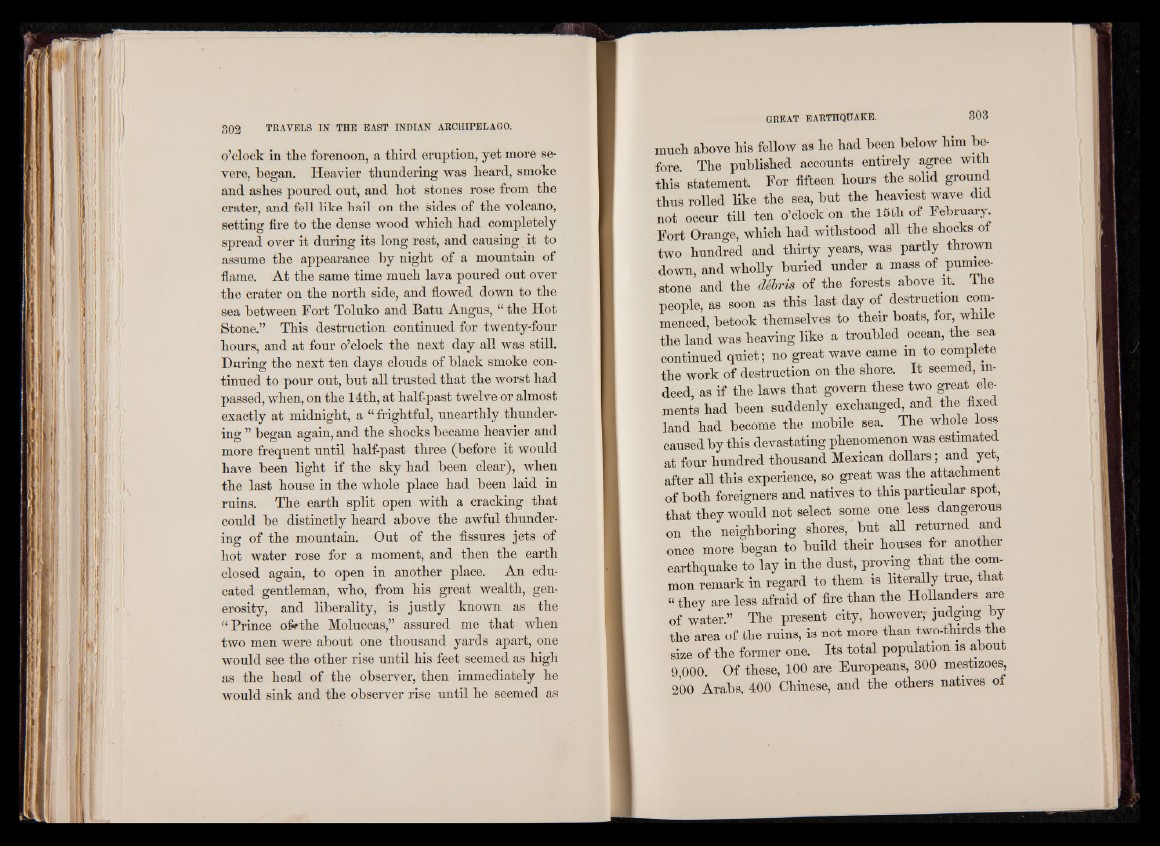
o’clock in the forenoon, a third eruption, yet more severe,
began. Heavier thundering was heard, smoke
and ashes poured out, and hot stones rose from the
crater, and fell like hail on the sides of the volcano,
setting fire to the dense wood which had completely
spread over it during its long rest, and causing it to
assume the appearance by night of a mountain of
flame. At the same time much lava poured out over
the crater on the north side, and flowed down to the
sea between Fort Toluko and Batu Angus, “ the Hot
Stone.” This destruction continued for twenty-four
hours, and at four o’clock the next day all was still.
During the next ten days clouds of black smoke continued
to pour out, but all trusted that the worst had
passed, when, on the 14th, at half-past twelve or almost
exactly at midnight, a “ frightful, unearthly thundering:
” began again, and the shocks became heavier and
more frequent unti• l half-past three (✓ before i• t would
have been light if the sky had been clear), when
the last house in the whole place had been laid in
ruins. The earth split open with a cracking that
could be distinctly heard above the awful thundering
of the mountain. Out of the fissures jets of
hot water rose for a moment, and then the earth
closed again, to open in another place. An educated
gentleman, who, from his great wealth, generosity,
and liberality, is justly known as the
“ Prince ofrthe Moluccas,” assured me that when
two men were about one thousand yards apart, one
would see the other rise until his feet seemed as high
as the head of the observer, then immediately he
would sink and the observer rise until he seemed as
much above his fellow as he had been below him before
The published accounts entirely agree with
this statement. For fifteen hours the solid ground
thus rolled like the sea, but the heaviest wave did
not occur till ten o’clock on the 15th of February
Fort Orange, which had withstood all the shocks of
two hundred and thirty years, was partly thrown
down, and wholly buried under a mass of pumice-
stone and the debris of the forests above it. The
people, as soon as this last day of destruction commenced,
betook themselves to their boats, for, while
the land was heaving like a troubled ocean, the sea
continued quiet; no great wave came in to complete
the work of destruction on the shore. I t seemed, indeed,
as if the laws that govern these two great elements
had been suddenly exchanged, and the fixed
land had become the mobile sea. The whole loss
caused by this devastating phenomenon was estimated
at four hundred thousand Mexican dollars; and yet,
after all this experience, so great was the attachment
of both foreigners and natives to this particular spot,
that they would not select some one less dangerous
on the neighboring shores, but all returned and
once more began to build their houses for another
earthquake to lay in the dust, proving that the common
remark in regard to them is literally true, that
“ they are less afraid of fire than the Hollanders are
of water.” The present city, however; judging by
the area of the ruins, is not more than two-thirds the
size of the former one. Its total population is about
9 000. Of these, 100 are Europeans, 300 mestizoes,
200 Arabs, 400 Chinese, and the others natives of